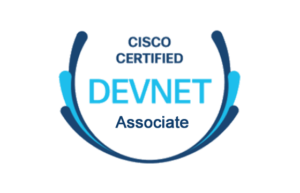Introduction
The networking industry is undergoing a transformation to using a software-oriented approach with APIs and automation. This change is driven by the ever-increasing complexity and size of networks due to new connections such as the IoT, as well as a need to deliver more agile networking services. This change requires a new software oriented skill set that complements existing networking skills. The DevNet Associate course teaches students the best practices of modern software development practices and DevOps, to understand and learn how to securely use APIs, and how to automate network operations using those APIs.
Course Overview
The DevNet Associate course introduces the methodologies and tools of modern software development, applied to the IT and Network operations. It covers a 360 view of the domain including microservices, testing, containers and DevOps, as well as securely automating infrastructures with Application Programming Interfaces (APIs). Students completing this course, gain practical, relevant, hands-on lab experience, including programming in Python, using GIT and common data formats (JSON, XML and YAML), deploying applications as containers, using Continuous Integration/Continuous Deployment (CI/CD) pipelines and automating infrastructure using code. The course prepares students for entry-level software development and infrastructure automation jobs and prepares them for the DevNet Associate certification exam.

